Peter MALONE
Jezebel/ 2019
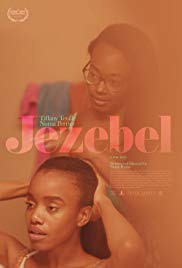
JEZEBEL
US, 2019, 88 minutes, Colour.
Tiffany Tenille, Numa Perrier, Brett Gelman, Stephen Barrington, Bobby Field, Rockwelle Dortch, Dennis Jaffee, Zoe Tyson.
Directed by Numa Perrier.
This is a small budget film written and directed by Numa Perrier who also plays a central role.
This is the story of an African- American family, hardships, attempts to find jobs, and connections with the sex industry.
The focus is on Tiffany Tenille as the younger sister, her older sister, Sabrina (Perrier) making a living by answering sex phone calls. Everybody in the cramped house is able to hear, young child, a teenage son, and Sabrina’s white boyfriend who also lives there.
The film presents the family warmly, strengths, criticisms and antagonisms. The teenage boy goes out and gets a job as a busboy. The boyfriend also gets a job.
Tiffany goes to an agency in Las Vegas, is immediately auditioned and given a job. She is taken under the wing of Vicki, who works for her brother who manages the company. Their role is online sexual behaviour, communication by Internet messages rather than by voice, the men unable to hear the comments (adverse or favourable) from the women. The language is generally in the tantalising vein with some explicit remarks and online behaviour, but always being careful of legislation. Tiffany is successful but takes exception to one man referring to her as ‘nigger bitch’, her resentful of the use of the word ‘nigger’. She tries to get other jobs, lined things up, possibilities in the porn industry.
In the background, is the concern about their ailing mother, the visits to her, her eventual death, their not having enough money to pay for the funeral.
There are some quarrels between the two sisters with Sabrina suggesting Tiffany move out and be on her own – but, the film ending, with a reconciliation between the two sisters, Tiffany getting her job back in the prospect of making a success of her life, possibly with one of the clients who sends her presents and almost courts her (even though he says he has a wife and children).
An entry to go into a different kind of world, an experience of the soft porn world, yet a look at the human characters involved.
Hot Summer Nights/ 2017
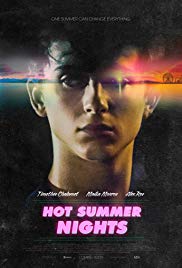
HOT SUMMER NIGHTS
US, 2017, 107 minutes, Colour.
Timothee Chalamet, Maika Monroe, Alex Roe, Emory Cohen, Thomas Jane, Maia Mitchell, William Fichtner.
Directed by Elijah Bynum.
A film with a target younger audience – or, perhaps, those in their mid-40s looking back to behaviour in the early 1990s.
The film is interesting to see because of Timothy Chalamet in an early role given his subsequent successful career. The cast consists of some up-and-coming actors as well as some veteran character actors like Thomas Jane and William Fichtner.
The film focuses on a rather timid teenager, Daniel, played by Chalamet. He clashes with his mother. He has very strong bond memories of his father who has died. This seems to set him on a different path from what he might have had. This is especially the case when he helps a local young drug dealer and conceals some drugs in a shop till from the police. The dealer, Hunter, Alex Roe, takes him under his wing. Daniel is clever and becomes more involved, experiences some drugs, with many suggestions about dealing, making contact with gangsters and doing deals. He also encounters Hunter’s sister, attracted to her, not telling Hunter and she not telling her brother.
This leads to a number of complications. Hunter and Daniel become strong friends. In the meantime he goes out with Hunter’s sister. There are various encounters with criminal types and successful deals. However, it does not last and there are shootouts. Also involved is the father of a young girl attracted to Hunter, a policeman played by Thomas Jane.
One of the strange aspects of the film is that there is a narration by younger teenager, not seen, but telling the story of Daniel and its consequences – with more than a touch of envy.
The setting also has a huge storm of the coast of Massachusetts and its eventually coming to land on the fateful night.
The screenplay has many references to similar films, spoiled young teenagers and their behaviour during the summer holidays, drug deals and gangsters, the complications of romances.
Radio Silence
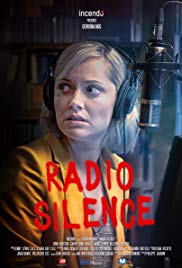
RADIO SILENCE
Canada, 2018, 90 minutes, Colour.
Georgina Haig, John Ralston, Carrie- Lynn Neales, Mark Senior, Alison Hossack, Sebastian Piggott, Erica Deutschman, Stefanie Nakamura.
Directed by Philippe Gagnon.
Radio Silence is a psychological thriller which has echoes of The Fisher King and the character played by Jeff Bridges and his impact on his listeners to his radio program.
Georgina Haig (born in Melbourne) plays a doctor who offers psychological help on radio. She sometimes has a hard manner, some thinking she talked down to those ringing in, urges, especially women, to “cut them loose� when they are the victims in a relationship. One night, a radio client is desperate, the doctor urging her to end her relationship – and she shoots herself on air.
The doctor retreats from her program for a year but, the failing radio station executives, persuade her to come on air again. The alleged victim calls in which complicates the emotional response of the doctor who is trying to be more humane. Then her producer is murdered. Later her former boyfriend, the building security guard, is also murdered. The police investigating are initially unsympathetic to the doctor.
When the suspects are all clear to the audience, the actual killer makes a speech almost indicating that she is the killer. For the unsuspecting, a twist. Those paying attention to the screenplay, the playing out of what has become obvious.
One of those enjoyable time-passers on television.
1. The title? Jill and her work on air, harsh manner, talking down to the listeners? The death? Her absence from the program and trying to rehabilitate herself?
2. A Canadian production, the Minneapolis setting, buildings, radio station, apartments, diners, the parking lot? The musical score?
3. The impact of Jill on air, hard and somewhat unsympathetic, her advice, cut them loose, Alexis and the shooting? Jill shock, retreating from radio for the year?
4. The executives, radio failing, need for money? Stuart, visiting Jill, asking her to come back on air? His manoeuvres? Her response? The initial hesitation on air? Her talking frankly to the listeners, remembering the past, the audience not hearing the shot? The plea for information? The phone call from Alexis? The ratings going up, callers, claiming to be Alexis?
5. The effect on Jill, a close friendship with Claire the producer, the audience seeing Claire murdered? Jill finding her, the blood? The detectives and their investigation, unsympathetic to Jill? Questions? The expert on tapes, able to highlight the tape being altered?
6. The interrogation of Li Chan, technician, wanting to be producer? The interrogation of Stuart, truth about his fabricating the tapes? The interrogation of Brett, security guard, the past relationship with Jill? His exit and entry from the car park?
7. Jill confronting Brett, his coming to the apartment, the relationship with Claire? His being shot?
8. Jill, talking with Daisy, Daisy seemingly sympathetic, her long speech about loss and grief, the death of her daughter? Almost admitting to the audience that she did it?
9. The final confrontation with Jill in the studio, the phone call, the truth about Brett and Alexis, her anger and grief? The gun aimed at Jill? Jill and the gun that Brett had given her, Daisy’s death? The police making allowances for the non-registration of the gun?
10. A pastime thriller?
Frozen II

FROZEN II
US, 2019, 103 minutes, Colour.
Voices of: Idina Menzel, Kristin Bell, Josh Gad, Jonathan Groff, Sterling K.Brown, Evan Rachel Ward, Alfred Molina, Martha Plimpton, Jason Ritter, Jeremy Sisto, Ciaran Hinds, Alan Tudyk.
Directed by Chris Buck, Jennifer Lee.
The original Frozen had an extraordinary impact in 2013, attracting a vast audience. It was a huge box office success – and, was seen, again and again, by young audiences on DVD and on television. It is somewhat surprising that it has taken so long for the sequel to appear.
This reviewer was present at a preview with some hundreds of children in the audience with their parents, many of the little girls, under 10, with their Princess dresses and eager anticipation – which seems to have been satisfied.
Once again, there are the two sisters, Elsa and Anna (voiced by Idina Menzel and Kristin Bell). But, if we were wondering what they were like when they were little, this is the opportunity to find out a bit more. They are devoted. And they have a wonderful mother and father, mother singing songs, father telling stories which reveal some of the darker side what had happened to the kingdom of Arendelle.
Then, they are grown-up, past the adventures of the earlier film, happy in the kingdom but worried about the disappearance of their parents. Worth noting that, as with the original film, there is no Prince Charming but the rather awkward local lad, Kristoff, rehearsing over and over again how he might propose to Anna and she too busy to have time to listen to him. There is also Olaf, the snowman, who provides most of the comedy, both in action and in jokey remarks. And, Kritoff has his reindeer who also gets his comic moments.
But, then it becomes interesting for the older audiences as well. The sisters set out on a quest to find their parents, to discover what truly happened in the past, to go through the forest of mist, findiing victims of war is living in the forests, and the opportunity for Elsa to use her magic powers and for Anna to use her common sense and her forceful character. Kristoff and the others, of course, helping her except when Elsa is frozen.
Needless to say, there is a happy ending (even for Kristoff), the quest and mission accomplished, and happy ever after for all in Arendelle.
1. The popularity of the original film? Story, characters, songs? (And no Prince Charming as such)?
2. The popularity of the sequel, the story of the two sisters, the background of the family, the evil curse, the quest?
3. The bright animation style, the range of voices, the range of songs?
4. Audience knowledge of the two sisters from the original film? Their background as children? The two little girls, the bonding? The characteristics of each? With their parents, the nobility of the king, the love of the mother, stories and songs, the king revealing the story of the past? The atmosphere of magical powers? Elsa with the magic? Anna ordinary?
5. The sisters growing up, the bonding with each other? The King on the expedition, disappearance? The background of the two communities, agreements and peace, the building of the dam, the story of the attack, the kingdom under threat? The visualising of the past, the revelation of the treachery of the grandfather? The consequences?
6. The range of characters, Kristoff, earnest, fumbling, his love for Anna? The reindeer and the action, the comedy? Olaf and his comic turns? The comedy?
7. The forest, the darkness and mist? The decision for the quest? Elsa feeling she must go to find their parents? Anna wanting to go, Kristoff accompanying them?
8. The travel, the range of adventures, discovering the wreck, no survivors?
9. The revelation of the past, the treachery of the grandfather, the betrayal? Finding the survivors in the forest? The range of people, ordinary, warriors, teaming with the sisters, supporting them?
10. Anna and Kristoff, her ordinary powers, involved in the search? Kristoff and the reindeers?
11. Elsa, her powers, the capacity to freeze, going on, her becoming frozen?
12. Anna, the group of survivors, the lifting of the spell?
13. The action of the quest, the adventures, the songs, the reindeers’ songs, heroics?
14. The kingdom and the refugees, being saved, the kingdom restored, everybody able to return?
15. Elsa and her powers and her mission? The symbols of Earth, Air, Fire, Water? Elsa as the fifth power? Anna, Kristoff, her becoming Queen?
Mon Frere/ Brother
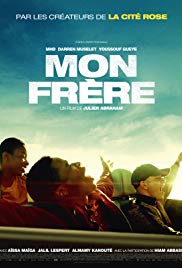
MON FRERE/BROTHER
France, 2019, 96 minutes, Colour.
MHD, Darren Muselet, Aissa Maiga, Jalil Lespert, Youssouf Gueye, Hiam Abbas, Lisette Malidor, Mark Grosy, Neva Kehouane, Didier Michon.
Directed by Julien Abraham.
A French film which can be widely recommended.
At the end, there is a quotation from a declaration of early 1945 that the state has responsibility for its young citizens and its young delinquents. This is a story of a young delinquent.
MHD portrays Teddy, a teenager who has been arrested for shooting his father. The film shows how the father was demandingly violent, brutal towards his wife who has left him. There are continued flashbacks to his treatment of Teddy and of his younger brother, Andy.
Teddy is sent to an institution for teenagers. He is rather silent, seems resentful, remembers his brother and the father’s violence. The institution has a group of interesting carers, some supervising, sometimes intervening in fights, a woman who has boxing skills and encourages the boys to spar and to surface their angers.
One boy is particularly resentful, Enzo, who torments Teddy. However, another boy, large and strong, Moise, turns the group against Enzo, violently humiliating him, leading him to want to escape and asking Teddy to go with him.
The goal is Amsterdam where Teddy’s mother lives. There are some disillusionment when Teddy finds his mother is pregnant. However, Enzo encourages him to go in to see his mother, citing the fact that he could never have this experience because of Enzo’s mother’s absence.
There is a twist at the end in terms of the memories of Teddy and his violent father and the fact that Andy had defended his brother and pulled the trigger. Hence Teddy’s concern throughout the film.
This is a strong film, with characters who are interesting, not always sympathetic, but dramatise harsh situations in homes and in institutions.
1. A slice of French life? Migrant families in France? Domestic violence? The law, internment?
2. The settings, the city and suburbs, the institution and interiors? The trip through France and Belgium? The city of Amsterdam? The musical score?
3. The introduction to Teddy, his grandmother, Andy, the court instructions? His being transferred to the institution? His quiet personality? The audience discovering through the flashbacks the violence of his father, demands, brutality, the mother leaving, and his attack? And the final revelation about Andy with the gun? Teddy’s sense of responsibility?
4. The grandmother, her care, with Andy, communicating with Teddy? With their mother? The visits?
5. The father, brutality? His wife leaving him, the secrecy? The mother, hiding, contacts, in Amsterdam, Teddy seeing her pregnant and his reaction? The reconciliation with his mother?
6. The authorities at the institution, caseworkers, care, interventions, Claude and her kindness, the boxing? Igor, his authority? Papou, ethnic background, authority? The interview with the head of the institution?
7. The various young men, initial reaction to Teddy? The introductions at the table? Enzo and his hostility? The daily life in the institution, and the rooms, sport, meals, showers, the creation outside? The portrait of the different characters?
8. Enzo, making trouble, the assault on Teddy, excrement and his cap, his boxing, the background of his story, the sexual assault, the inmates attacking him, wanting it filmed? Teddy having to get the phone and film? His reaction against the assault? Getting out? His being interrogated by the head?
9. The continued flashbacks, Teddy’s memory of his father, the violence? The discussion with the staff, the boxing and his being unable to continue, then punching?
10. The pressure from Moise? Wanting to leave, with Enzo, Enzo and his violence against Moise, the bike, getting the car, holding up the two young men and ousting them? Getting Andy, Enzo’s hostility, the getting used to each other, the trip?
11. Amsterdam, Teddy and his dancing with the girls, Enzo and his reticence? Finding the mother, her being pregnant, Enzo and his story about not having a mother, urging Teddy out?
12. Teddy and Andy, on the roof, the staff finding them, urging them on, the final close-up of Teddy’s face? His future?
Burning Cane
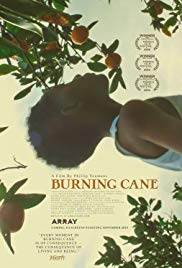
BURNING CANE
The 2019, 78 minutes, Colour.
Wendell Pierce, Karen Kaia Livers, Dominique Mc Clellan, Braelyn Kelly Emyri Crutchfield.
Directed by Philip Youmans.
This is a brief film which received quite some acclaim from critics. It was written and directed by a 19-year-old student filmmaker, Philip Youmans, from Louisiana and drawing on his experience of life there and his Baptist upbringing.
It is a portrait of life in Louisiana, in the rural towns with the cane crops. But the focus is on a group of characters, African- American characters in this context.
Karen Kaya Livers is striking as an elderly woman, Helen, introduced with a long monologue about finding some healing for her dog. She is in contact, especially in church, with the local Minister, played with some force by Wendell Pierce. He conducts the services, encourages the choir, sings, preaches quite hard-hitting sermons which serve as background voice-over. However, he has had a history of domestic violence in his family, is an alcoholic, a harsh arguer, needing to be rescued by Helen.
The other story is about Helen’s son, unemployed, violent towards his wife, exploitative of his son, a young boy, encouraged to drink alcohol and to sit and watch television with his father, including some pornography.
Helen, however, has some friends with whom she can talk and in whom she can confide.
So, a slice of Louisiana life, strikingly photographed, well-performed, thoughtful and challenging.
1. Title? The visual images? Films and plantations?
2. The Louisiana towns, homes, church, workplaces, isolation? The visuals, the colour photography?
3. The work of the writer-director, 19 years old, film student, drawing on his Baptist background?
4. The character studies? Monologues, conversations, crises?
5. The opening, Helen introducing the story, her age, character, the monologue, her concern about her dog, attacking the invading dog? Possibilities for healing the dog? Her life, her relationship with her son, his family? Her support of the church? The conversations with her friends? Her concern about the Reverend, his drinking, rescuing in?
6. The Reverend with his sermons, the voice-over, the serious themes, the religious dimensions, the role of God, obedience, churchgoing? The hymns, choir?,
7. His drinking, the background of his violence towards his wife, his reliance on Helen, going into town, the shopping, the drinking, stranded in the countryside, Helen rescuing him? Yet continuing his work in the church, his sermons and exhortations?
8. Helen and her son, Daniel’s story, out of work, his wife working, his resentments, his violence towards her, the blood? With his boy, watching the television programs, the pornography? The alcohol? His son’s age, experience, the father plying his son with alcohol, the consequences?
9. Helen, desperate, her willingness, her strong stances, physical disability?
10. A slice of life, the religious background, evangelical, fundamentalist, images of God, of worship? Ordinary people, African- American people, the south, hardships, poverty?
Brexit: the Uncivil War

BREXIT: THE UNCIVIL WAR
UK, 2019, 92 minutes, Colour.
Benedict Cumberbatch, Rory can year, Lee Boardman, Richard Goulding, John Heffernan, Oliver Morton, Simon Paisley, Paul Ryan.
Directed by Toby Haynes.
This is a British docudrama, a star vehicle for Benedict Cumberbatch and his portraying of political adviser, Dominic Cummings, a man who is prominent in conservative circles but who moved out with some disillusionment of the political system.
This is a docudrama of the Brexit campaign, especially the Leave campaign, for Britain’s Brexit crisis. Cummings is invited in by various political and business interests to lead the Leave campaign and is given complete charge. He is an abrasive personality, dominating, with little regard for people’s feelings. However, he devises a campaign, elaborating databases for information, out-manoeuvring the campaign for Remain which is led by Craig Oliver (Rafe Spall).
Benedict Cumberbatch gives a tour-de-force performance, resisting invitations by UKIP and Nigel Farage and Aaron Banks. He also alienates Conservative members who expect a much more traditional campaign. However, Cummings goes out to meet ordinary people who feel undermined by the European Union. He then devises the successful slogan, Take Back Control.
At the end, Cummings seems to back out from the campaigns and politics. However, by 2019 he was, in fact, advising Prime Minister Boris Johnson in the tactics to get Brexit passed by the House of Commons.
1. A docudrama? The campaign for the UK staying in the European Union or leaving? Brexit? The title – and the consequences of the battle, an uncivil war?
2. The setting, UK 2015, the announcement of the referendum, the discussions about campaigns, for remaining, for leaving? This film for a British audience and the decisions made? For audiences outside the UK?
3. The role of Dominic Cummings, the prologue and his talking about technology and politics, the discussions with the Leave proponents, especially all Nigel Faraj and UKIP? Meetings with Farage and Aaron Banks? Cummings not wanting to join them?
4. The Tories wanting to leave the EU, the approach to Cummings, the discussions, his personality, abrasive? His character, background, Westminster advisor, his family? His acceptance of the role, his total control?
5. The details of Cummings campaign, the whiteboard, the technology, the database, Zach Massingham from Canada, his contribution? Cummings irritating the traditionalists, their wanting a campaign of posters, advertising, phone calls…? His despising them, ridiculing them, the reactions? The variety of personnel on his side? The media?
6. The character of Craig Oliver, the Remain campaign, parallels with Cummings, contrasts? Principles, tactics, confidence in the correctness of the campaign? The range of personalities, politicians?
7. The invented sequence of Cummings and Oliver meeting, talking, comparing notes? Inevitabilities?
8. Cummings and his slogan of Take Back Control? Issues of Turkey joining the EU? Issues of independence, British sovereignty? His not campaigning in Remain areas? Taking the politician to visit the family, unemployment, poverty, lack of opportunity? The meetings, the clashes, heightened feelings about staying or leaving?
9. The effectiveness of the campaigns? The vote, the announcement of the results? Cummings and his achievement? The disappointment of those who wanted to remain?
Fall from Grace, A
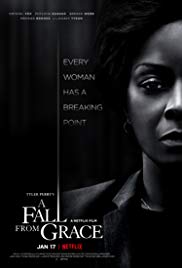
A FALL FROM GRACE
US, 2020, 122 minutes, Colour.
Crystal Fox, Phylicia Rashad, Bresha Webb, Mehcad Brooks, Cicely Tyson, Tyler Perry, Matthew Law, Donovan Christie Jr, Adrian Pasdar.
Directed by Tyler Perry.
Tyler Perry has his own studios and is a prolific writer and director of films, noted for his Maedea series, very popular amongst African-American? audiences.
While he works with African- American stories and characters, some of his dramas have had wider popularity, especially with his association with Netflix.
In its way, this is a universal story, not dependent on race, but with a strong cast of African- American actors, Crystal Fox in the central role, and an opportunity to see Phylicia Rashad after her television success on the Cosby Show. Veteran actress, Cicely Tyson, age 94, has a strong cameo role. Tyler Perry is the head of a law firm. Bresha Webb is the aspiring lawyer who is asked to take on a case and persuade the defendant to plead guilty. Adrian Pasdar is the white prosecutor.
The film opens with a suicide and the young lawyer’s husband as the negotiator. While this is a prologue, it recurs at the end with some force.
The basic story is told in contnuous time, the interviews by the lawyer with the defendant, and with her best friend (Phylicia Rashad). The defendant, Grace, tells her story in flashback, focusing on her divorce, her living alone, her work, encountering an artist photographer, his courting her, and their marriage, and then her complete disillusionment.
The young lawyer fails at her attempt to defend her client, demands further interrogation of a witness, is charged with contempt of court by the judge.
The solution takes place rather quickly at the end of the film, some twists, especially concerning the best friend, that audiences would not have anticipated. And this leads to further complications.
Which means that this is an interesting murder investigation film and court case.
1. The title? The focus on Grace herself and her experience? The focus on Jasmine, the challenge to her legal career, the seeming failure on being fired? Vindication?
2. The setting in the legal office? Homes? Banks, art galleries, courtroom scenes? The musical score?
3. The opening, the woman on the balcony, the police trying to talk down, the helicopter light, her jumping? The irony of Jasmine’s husband being there? The irony at the end with the information about woman on the balcony and the other exploited women?
4. The law, Rory, in charge, tough with assigning the case to Jasmine, his wanting a plea, assumption of guilt? His criticisms of Jasmine? In the court, his disappointment, his threats to her? Visiting her in jail? His change of heart at the end?
5. Jasmine, her relationship with her husband, the hopes for a family, her legal studies and work, timid yet determined, her relationship with the fellow workers, discussions and jokes, their collaboration with on the case?
6. Going to visit Grace? Middle-aged, resigned? Admitting her guilt? Not wanting her son involved? The flashbacks, her husband and his infidelity, the divorce, her working on the bank, her quiet life? Meeting Sarah, the friendship with Sarah, Sarah encouraging her to go out, reticence, the photos, going to the Gallery, talking to Shannon and her perspective on women taking the photos and sensitivity? Discovery of the truth, her leaving? His tracking her down? The dates, her control, the exhilaration, a new lease on life, his proposal, her acceptance, the marriage, the joy, the sexual vitality? All going well?
7. Jasmine, her listening, her thinking Grace could not be a killer? The discussions with her husband? The issue of the plea, Grace accepting her guilt, the possibility for the plea? Jasmine and the changing of her mind? Rory and his anger, his visit to Grace? Not approving a trial for grace?
8. Jasmine, going to visit Sarah, Sarah as genial, friendly to Grace, supportive of her? Willing to testify in court?
9. Grace, the discovery of the loss of the money, the mortgage, discussions with the bank officials, the signature, the ruined house? Puzzled, talking with Shannon? The revelation of Shannon with the women, his turning on Grace?
10. Shannon, the photography, Ethiopia, his charm, courting Grace, the outings, the proposal? The revelation of the truth, the law, his right to the money, to the house? Bringing in women? Taunting Grace? Her upset, the baseball bat and hitting him, dragging the body away? Her driving into the countryside? Her guilt – but their being no body?
11. The court case, the jury, the prosecutor and his self-confidence, appeal to the jury? Looking down on Jasmine? Jasmine, her hesitations, the judge and his strictness? The addresses to the jury, the interrogation of the witnesses, the creation of doubt? Sarah coming to the stand, the threat of perjury, a statement that Grace had committed the murder?
12. Jasmine upset, wanting to call Sarah again, her stubbornness with the judge, contempt of court, behind bars, the apology and going home?
13. The verdict, life imprisonment, the media response?
14. Grace noting the pendant with Sarah, suspicions? Jasmine, her decision to go to the house, the encounter with Alice, Alice’s address, Jasmine’s suspicions? Sarah out, going into the house, the encounter with Shannon, his violence towards her? The trapped women and the racket? Her husband getting the notification, coming to the house, Sarah not letting him in, the door, his finding Jasmine, the clash with Shannon? Handcuffing Sarah – but her escape?
15. The court, the vindication, free? The triumphant Jasmine, Rory’s approval? But the glimpse of Sarah, after the revelation that she was Shannon’s mother, their connivance over the years to get the money, the charges against him and his exploiting of women in many states, Sarah going back to her ways and infiltrating her way into the house?
Security/ 2017
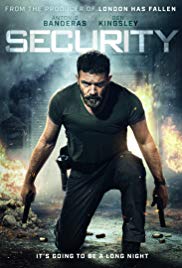
SECURITY
US, 2017, 88 minutes, Colour.
Antonio Banderas, Ben Kingsley, Liam McI ntire, Cung Le, Katherine de la Rocha, Chad Lindberg.
Directed by Alain Desrochers.
Antonio Banderas is an action hero. And Ben Kingsley again as a smooth villain.
The plot is fairly straightforward: the murder of a witness against a large syndicate, the daughter, Jamie, in witness protection, the attack on the marshals, her escape through the woods and coming to the large mall. In the meantime, the audience has been introduced to Eddie, losing his job in military service, becoming a security guard at the mall.
Almost instantly, Jamie comes for safety in the mall, the villain, Ben Kingsley, comes offering money and terms, the security guard squad refusing, preparing for a siege, the staging of the siege with a lot of action and strategies, the surprise that the sympathetic members of this security squad are killed, the girl is saved and the alienated Eddie is able to reunite with his family.
1. The title, work, demands, responsibilities, dangers?
2. The action taking place in the mall, the tour, the range of shops, upmarket, the offices in surveillance, the use of the variety of locations within the mall, the destruction?
3. Action sequences, choreography, fights? The musical score?
4. Antonio Banderas as an action hero? His background, family, service and retirement? Desperate searching for a job? The interview? Phone call to his family?
5. Going to the mall, the members of the staff, Vance and his easy-going manner, Mason and his being serious, Rebecca and the hangover, Johnny Wei? Eddie and his seriousness? The quick learning of the ropes? On duty?
6. The squad of US marshals, the cars, the attack, the numbers in the force, Jamie, escaping from the car, into the woods, to the mall? Being taken in?
7. Charlie, coming to the door, the discussion, the offer of the money? The sense of menace? The background of the case, Jamie testifying, the pursuit, to be stopped? Charlie and his supervision of his squad? Smooth, quiet, stepping in at the end?
8. The preparation of the siege, Eddie taking charge, the various strategies, tactics, explosives, hiding Jamie, her coming out, the camera on the car?
9. The attack, Eddie and his skills, the group, each of them giving their life? The buildup to the climax between Eddie and Dead Eyes? The fake police and security?
10. Charlie, taking charge, capturing Jamie? Eddie and his defeat of the killers, the truck exploding, coming inside to confront Charlie?
11. The hospital sequence, Jamie thinking Eddie? Eddie going back to his family?
Boy Called Sailboat, A
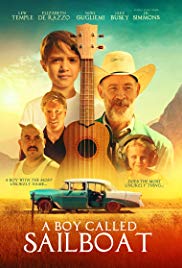
A BOY CALLED SAILBOAT
US, 2018, 92 minutes, Colour.
Julian Atocani Sanchez, Keanu Wilson, Noel G, Elizabeth De Razzo, Jake Busey, J.K.Simmons.
Directed by Cameron Nugent.
While this is a very American story, focus on a Hispanic family living on the border, it was, in fact, written and directed by Australian actor, Cameron Nugent. Nugent began his media life as an actor in a great deal of Australian children’s television, so he can draw on the experience of telling children stories.
And, this is what A Boy Called Sailboat is, the story of a little boy, Sailboat, age 6, living with his parents, his father working as a handyman at the local school, his mother at home, cooking ever more frequently meatballs. They live in a rather ramshackle house which, at first glance, looks lopsided. And, it is, held more or less upright by a long beam which the father continually hovers over in case of the collapse (spoiler alert: at one stage it does collapse), but making every effort to make the house upstanding again.
In fact, given so many aspects of magic realism in the story and in the characters, this is a small family film which would could be called a fable. And, so much of it is seen from the perspective of the six-year-old Sailboat.
One day he finds a small discarded guitar, sets himself to learn to play it, encouraged by his parents, as well as the little girl at school. On a visit to his ailing grandmother in hospital, he decides that he must compose a song for her. And, over the weeks, he does. And, it seems to be the most charming and beguiling song ever written, melting all those who listen to it, fascinating the other children and their teacher, crowds gathering outside the house to hear Sailboat seen.
And, with the beauty of the song, its message, its tears – the only people not to hear it of the film’s audience, the writer-director using the device of the soundtrack going silent, the audience watching the boy and the audience, not hearing any sound and so, having to supply whatever wonderful song, music and lyrics, that appeal to them. The audience is asked to supply its own beauty and message.
The film has quite a lot of detail, the genial parents, both large and affectionate, always enjoying the meatballs and, increasingly cooking them to distribute to the ever-gathering larger crowds. Jake Busey does an odd turn as the enthusiastic teacher who might not get employment in a school with demanding requirements. He is a nice man. He fosters the song and singing. Then there is the little boy, Peeti, not much older than Sailboat who spends his life kicking a football and putting drops in his eyes because he cannot blink. There is also an entrepreneur who wants to get Sailboat on the radio.
The film has won a number of awards as a family film and, it might delight families, especially the youngsters who can identify with Sailboat and Peeti. The adult audience must let itself succumb to the magic realism of the story and characters - and supply the most beautiful song and message that they know.
1. The title? A little boy aged 6? The junkyard and the Sailboat and his desire to have it?
2. The writer-director, his Australian background in children’s television? His ability in telling a child’s story? The child’s point of view? A fable?
3. The locations, the border and New Mexico? Hispanic families? White American families? The musical score?
4. The song that Sailboat composes, the range of songs in the musical score, the fact that his song is never heard by the audience, the response of those who hear it, rapture and tears, happiness? The audience having to supply its own song and melody and emotion?
5. Sailboat, his family, the Hispanic father, the old car, the old house and its leaning, held up by the pole? His mother, large, cooking, the meatballs, the family enjoying them?
6. Sailboat, his friend Peeti, Peeti kicking the ball, his dry eyes and the need to moisten them continually? The friendship between the two boys?
7. The young girl, her family, at school, her interest in Sailboat, visiting him, the music and the guitar, her supporting him, the friendship between the two?
8. The junkyard dealer, driving, the Sailboat, his goods, his sales pitches?
9. At school, the teacher, eccentric, his classes, the behaviour of the children? The football matches? The sports master, the families watching, the games? The expedition, the bus, breaking down? The teacher and his personality? Supporting the song?
10. Sailboat finding the guitar, fixing it, learning to play, practising? The response of his father?
11. The house, the collapse, getting the vehicle to pull the pole upright, setting the house right?
12. Sailboat, his grandmother, her illness, the visits? Her wanting a song?
13. Sailboat, his contemplation, the creation of the song?
14. The song, performing it, the family, the grandmother, the children at school, the crowds gathering of the house, ever-increasing numbers? (And the mother cooking and distributing ever more meatballs?)
15. The entrepreneur, curiosity about the song, meeting Sailboat, Sailboat going off with him, the discussions in the car? At the radio station, the DJ unwilling? Hearing the song? Its possibilities?
16. Audiences responding to the characters in the story? The experience of the song, even not hearing it? And a fable about human nature and goodness?